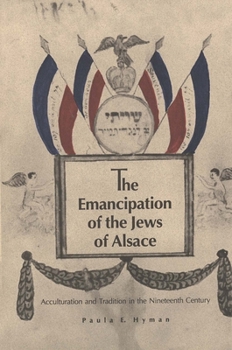The Emancipation of the Jews of Alsace: Acculturation and Tradition in the Nineteenth Century
Select Format
Select Condition 
Book Overview
European Jews achieved civil emancipation during the nineteenth century, becoming equal citizens with all the rights and responsibilities of their Gentile compatriots. This book explores for the first time the impact of this emancipation on a traditional Jewish population largely untouched by secular culture. Focusing on the Jews of Alsace, Paula E. Hyman explores their patterns of acculturation and integration in both countryside and city, analyzing the political, social, and economic factors that not only reshaped their behavior and self-understanding but also sustained their traditional Jewish practice.
Drawing on governmental sources, literature, memoirs, and communal records, Hyman relates the experiences of ordinary Jews--the cattle dealers, peddlers, and shopkeepers who lived in the villages and small towns of Alsace. She finds that these Jews resisted new outlooks and new spheres of activity, and that their transformation was far slower and more uneven than the rapid acculturation of Jewish urban elites discussed by previous historians. Hyman describes the Alsatian Jews' emergence from cultural and social isolation, the impact of migration and urbanization, their drift from religious orthodoxy, and the alliance of their community leaders with French authorities. Since European Jews were a largely rural population until after mid-century, Hyman's social history of a typical village society has important implications for understanding the development of Jewish modernity throughout Europe
Format:Hardcover
Language:English
ISBN:0300049862
ISBN13:9780300049862
Release Date:October 1991
Publisher:Yale University Press
Length:224 Pages
Weight:1.15 lbs.
Dimensions:0.9" x 6.5" x 9.6"
Customer Reviews
0 rating





